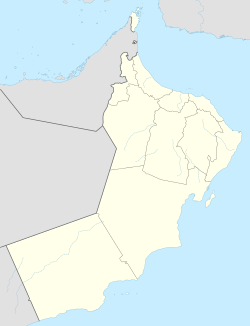| Motishwar Mandir | |
|---|---|
 | |
| Religion | |
| Affiliation | Hinduism |
| Province | Muscat Governorate |
| Deity | Adi Motishwar Mahadev, Motishwar Mahadev and Hanuman |
| Festivals | Maha Shivaratri, Vasant Panchmi, Ramnavmi, Hanuman Jayanti, Shravan and Ganesh Chaturthi |
| Location | |
| Location | Muttrah, Old Muscat |
| Country | Oman |
| Geographic coordinates | 23°36′35″N58°35′18″E / 23.609729°N 58.588217°E |
| Architecture | |
| Completed | 1892-1909 |
| Temple(s) | 3 |
Motishwar Mandir is a Shiva temple complex located near the Al Alam Palace in the Muttrah area of Old Muscat, Oman. It is one of the oldest Hindu temples in the Middle East region. [1] The temple celebrates numerous Hindu festivals such as Vasant Panchmi, Ramnavmi, Hanuman Jayanti, Shravan and Ganesh Chaturthi. Over 20,000 Hindus visit the temple during Maha Shivaratri. [2]


